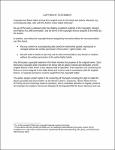A Sequential Explanatory Mixed-Methods Study of Fundraisers’ Self-Disclosure in Major Gift Fundraising Relationships
| dc.contributor.supervisor | Hudson, Jane | |
| dc.contributor.author | Nelson, Deanna | |
| dc.contributor.other | Plymouth Business School | en_US |
| dc.date.accessioned | 2024-03-13T09:43:23Z | |
| dc.date.available | 2024-03-13T09:43:23Z | |
| dc.date.issued | 2024 | |
| dc.identifier | 10565987 | en_US |
| dc.identifier.uri | https://pearl.plymouth.ac.uk/handle/10026.1/22173 | |
| dc.description.abstract |
Name: Deanna Nelson Title: A Sequential Explanatory Mixed-Methods Study of Fundraisers’ Self-Disclosure in U.S. Major Gift Fundraising Relationships This study explores the role of fundraisers’ self-disclosure in major gift fundraising relationships. Building relationships with major donors to secure major gifts is a primary concern for leaders of non-profit organisations (Buteau et al., 2019) because major gifts can have a transformational impact on an organisation’s work. However, the existing literature demonstrates that interpersonal aspects of relationship development, such as utilising self-disclosure to establish and strengthen relationships, have not been sufficiently researched in the literature. Social penetration theory (Altman & Taylor, 1973), which states that relationships progress through phases defined by sharing increasingly more personal information, serves as the theoretical underpinning for the research. The current research was conducted in two phases. The first phase included a cross-sectional survey distributed at one U.S. institution of higher education (N = 290). The second phase included 20 semi-structured interviews with major gift fundraisers who work in higher education. Key findings indicated that self-disclosure is an important part of fundraiser-donor interactions and helps fundraisers build trust with donors by ‘humanising’ the fundraiser and making the donors feel more comfortable. Fundraisers perceive their disclosures help facilitate fundraising interactions, and in some cases, increase the likelihood of a donor giving. Contributions to knowledge include identifying self-disclosure as an effective tool for fundraising relationship development, increasing understanding of how fundraisers use self-disclosure to build relationships with donors, testing social penetration theory (Altman & Taylor, 1973) in a new context, fundraising, and investigating its predictive power on donors’ giving intention, and further expanding the understanding of the role fundraisers play in the fundraising process. | en_US |
| dc.language.iso | en | |
| dc.publisher | University of Plymouth | |
| dc.subject | fundraising, relationship development, relationship fundraising, self-disclosure | en_US |
| dc.subject.classification | PhD | en_US |
| dc.title | A Sequential Explanatory Mixed-Methods Study of Fundraisers’ Self-Disclosure in Major Gift Fundraising Relationships | en_US |
| dc.type | Thesis | |
| plymouth.version | publishable | en_US |
| dc.identifier.doi | http://dx.doi.org/10.24382/5161 | |
| dc.identifier.doi | http://dx.doi.org/10.24382/5161 | |
| dc.rights.embargoperiod | No embargo | en_US |
| dc.type.qualification | Doctorate | en_US |
| rioxxterms.version | NA |
Files in this item
This item appears in the following Collection(s)
-
01 Research Theses Main Collection
Research Theses Main


